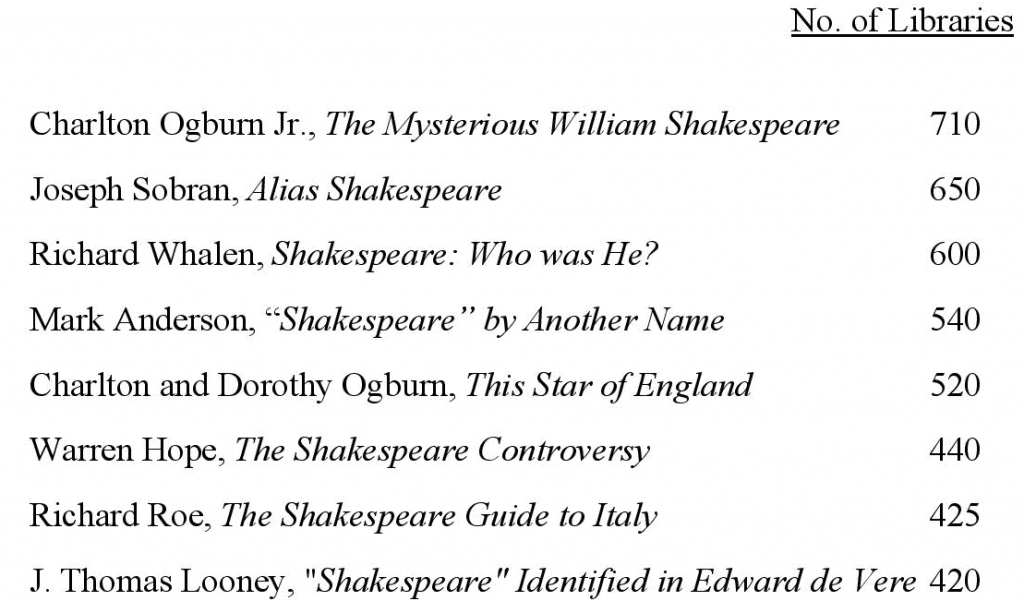Goldstein: Engaging Academics and Theatre Professionals
By Gary Goldstein

Since the Shakespeare authorship issue is an intellectual pursuit, Oxfordians need to engage professors in English, Theatre, and History Departments to advance the case for Edward de Vere as Shakespeare in the academic community. On the one hand, we have failed to break a quarantine on Oxfordian research by English professors, who refuse to teach the subject or allow papers to be published in their peer-reviewed journals, or even allow presenters to speak on Oxfordian scholarship at academic conferences. Furthermore, professors of History have refused to delve into the subject at all.
On the other hand, we have found a receptive spirit among university librarians, who have stocked many Oxfordian books over the past generation. A search of the leading Oxfordian titles is revelatory in this regard. Employing the World Catalog of Libraries at www.worldcat.org, the objective data are listed in the table below:

There is yet another component to engaging university students and instructors in the humanities about the Oxfordian hypothesis: whether research in The Oxfordian, the annual journal of the Shakespeare Oxford Fellowship, is indexed and catalogued in the relevant online bibliographies, such as the World Shakespeare Bibliography, the Modern Language Association International Bibliography, and ProQuest. This is vital because accessing these bibliographies is how researchers will discover what Oxfordian evidence is available and how to retrieve it. These databases are available only to paid subscribers, most of which are universities.
The World Shakespeare Bibliography is administered by Texas A&M University for the Folger Shakespeare Library, the Modern Language Association performs indexing for its own bibliography, and ProQuest does likewise. ProQuest now publishes the bibliography known as ABELL – the Annual Bibliography of English Language and Literature – and completes the trinity of scholarly databases that enable Oxfordian scholarly activity to become part of the institutional mind on a perpetual basis.
The good news is that articles and book reviews in The Oxfordian, now in its 20th year of publication, are listed in the WSB and MLA bibliographies, starting with its first issue, and in ProQuest, starting with volume 12. In addition to The Oxfordian, the World Shakespeare Bibliography also indexes the SOF’s Brief Chronicles journal and Shakespeare Oxford Newsletter. The Modern Language Association indexes Brief Chronicles as well. And, for more than a decade, The Oxfordian has been offered to academics by the library distribution service known as EBSCO; indeed, some 600 libraries today stock The Oxfordian, most in the electronic edition.
Since theatre is where Shakespeare will continue to flourish or perish, as theatre productions make the language of Shakespeare come alive for audiences, engaging theatre professionals is where a major breakthrough may occur. Showing theatre actors, directors and dramaturgs how a different Shakespeare can transform productions of the plays may be how we demonstrate the relevance of the authorship for modern scholars and audiences.
In that regard, for the first time, the Oxfordian case is being presented to the theatre community in the 18th volume of the semi-annual online journal Critical Stages. The publication of the International Association of Theatre Critics, it has devoted a special issue to the Shakespeare authorship question and is now online at critical-stages.org.
The special issue offers readers nine interviews, articles and papers on the authorship in general and the Oxfordian hypothesis in particular. Introduced by issue editor Don Rubin, Professor Emeritus at York University, the journal publishes interviews with British actors Mark Rylance and Sir Derek Jacobi, as well as articles by Canadian actor Keir Cutler, PhD, and American actor Hank Whittemore, showing how the authorship question has influenced how they perform Shakespearean roles. Other pieces provide detailed suggestions on how productions of the plays can be transformed when the Earl of Oxford is accepted as the playwright William Shakespeare. This includes using the playbill to educate audiences on the topical allusions incorporated in the plays to recapture the author’s original intent, and updating the plays for modern audiences using editing, casting choices and psychological interpretation.
Oxfordians with contacts in the theatre community, whether at the commercial or university level, are encouraged to promote this unique opportunity for educational outreach.
Membership dues cover only a fraction of our budget, including all our research, preservation and programming. Please support the SOF by making a gift today!
Blue Boar Tavern: Wassail Q&A
Tuesday Dec. 17, 8pm E / 5pm P
Sign up below for event invites!
